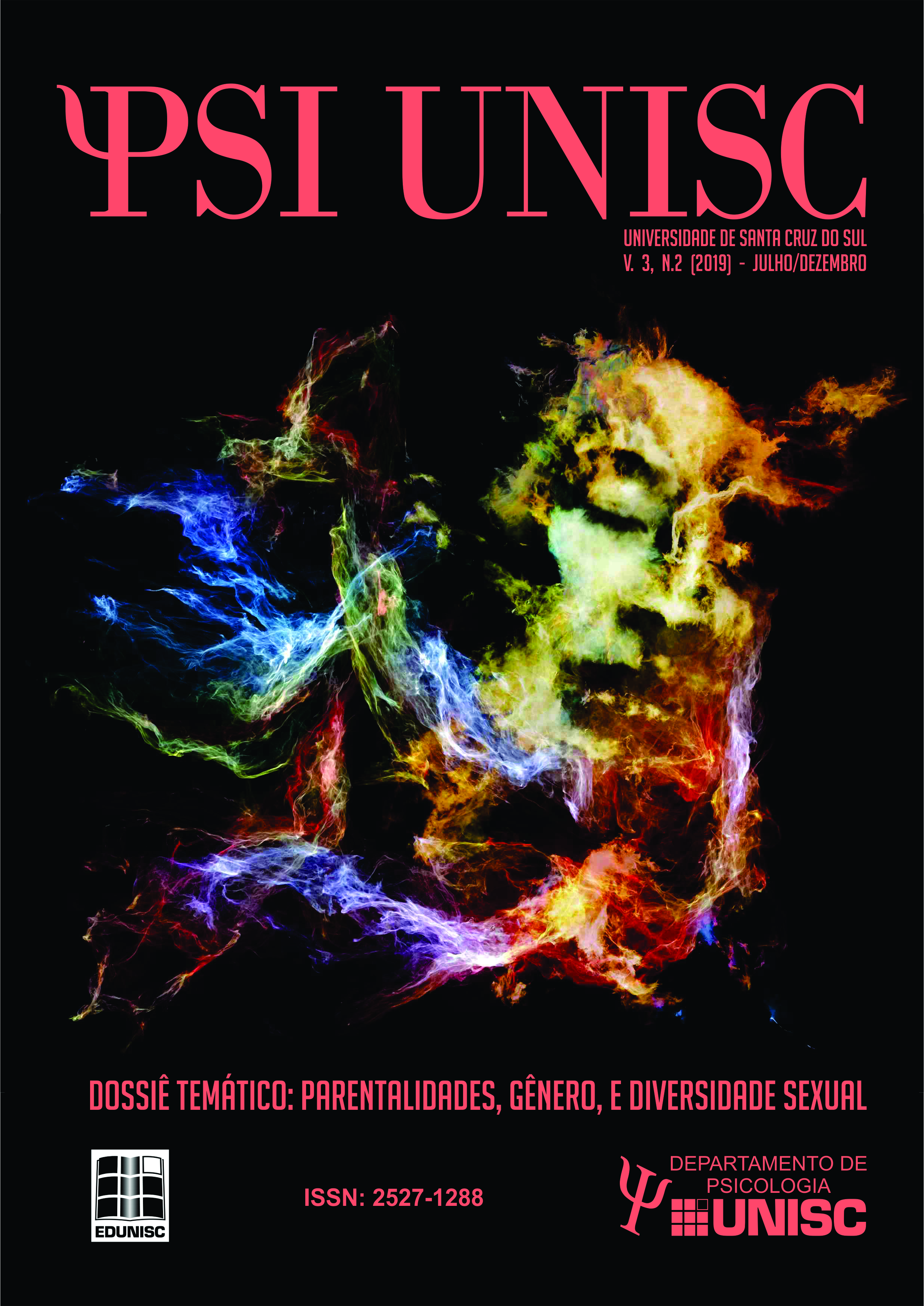Maternal experiences in the context of prematurity: A systematic review study
DOI:
https://doi.org/10.17058/psiunisc.v3i2.12693Keywords:
Prematurity, Maternal experiences, Systematic review.Abstract
Preterm labor occurs when a baby is born before 37 weeks of gestation. The preterm labor more likely to present clinical problems, which means that he or she must be admitted to the neonatal intensive care unit (NICU), and this situation has an impact on the development of the mother-infant bond and consequently on maternal experiences. The objective was to carry out a systematic review of the literature, mapping the empirical studies about maternal experiences in a situation of prematurity. It was used as search terms “premature or preterm birth and maternal experiences”, only in the English version. We considered the empirical articles made available in full and published in English or Portuguese, coming from psychology, in the last five years. The search was carried out in January and February of 2018. The results were analyzed through ten categories: types of publication; year of publication; mainland and country of origin of the article; academic training of researchers; predominant language in publications; study objectives; design; participants; instruments; and results. Six articles were found, mostly published in multidisciplinary journals, by authors of the medical field, with a qualitative design, in English, with the main focus being the evaluation of the services provided by the health team in the NICU. There was only one article written by psychologists, evidencing, therefore, the need for greater insertion of this professional in this context.
Downloads
References
Almeida, T. S. O., Lins, R. P., Camelo, A. L., & Mello, D. C. C. L. (2013). Investigação sobre os fatores de risco da prematuridade: Uma revisão sistemática. Revista Brasileira de Ciências da Saúde, 17(3), 301-308. doi:10.4034/RBCS.2013.17.03.14
Bowlby, J. (1997). Formação e rompimento dos laços afetivos (3a ed.). São Paulo: Martins Fontes
Brazelton, T. B., & Cramer, B. (1992). As primeiras relações. São Paulo, SP: Martins Fontes.
Breakwell, G. M., Hammond, S., Fife-Scham, C., & Smith, J. A. (2010). Métodos de pesquisa em psicologia. Porto Alegre, RS: Artmed.
Fernandes, R. T., Lamy, Z. C., Morsch, D., Lamy Filho, F., & Coelho, L. F. (2011). Tecendo as teias do abandono: Além das percepções das mães de bebês prematuros. Ciência & Saúde Coletiva, 16(10), 4033-4042. doi:10.1590/s1413-81232011001100008
Ferrari, A. G., & Donelli, T. M. S. (2010). Tornar-se mãe e prematuridade: Considerações sobre a constituição da maternidade no contexto do nascimento de um bebê com muito baixo peso. Contextos Clínicos, 3(2), 106-112. doi:10.4013/ctc.2010.32.04
Finlayson, K., Dixon, A., Smith, C., Dykes, F., & Flacking, R. (2014). Mothers’ perceptions of family centred care in neonatal intensive care units. Sexual & Reproductive Healthcare, 5(3), 119-124. doi:10.1016/j.srhc.2014.06.003
González-Serrano, F., Lasa, A., Hernanz, M., Tapia, X., Torres, M., Castro, C., & Ibañez, B. (2012). Maternal attachment representations and the development of very low birth weight premature infants at two years of age. Infant Mental Health Journal, 33(5), 477-488. doi:10.1002/imhj.21345
Guillaume, S., Michelin, N., Amrani, E., Benier, B., Durrmeyer, X., Lescure, S., … Zana-Taïeb, E. (2013). Parents’ expectations of staff in the early bonding process with their premature babies in the intensive care setting: A qualitative multicenter study with 60 parents. BMC Pediatrics, 13(1), 18-26. doi:10.1186/1471-2431-13-18
Hagen, I. H., Iversen, V. C., & Svindseth, M. F. (2016). Differences and similarities between mothers and fathers of premature children: A qualitative study of parents’ coping experiences in a neonatal intensive care unit. BMC Pediatrics, 16(1), 92-100. doi:10.1186/s12887-016-0631-9
Lebovici, S. (1987). A constituição do elo entre a mãe e o recém-nascido. In S. Lebovici (Org.), O bebê, a mãe e o psicanalista (pp. 115-126). Porto Alegre, RS: Artes Médicas.
Ministério da Saúde. Secretaria de Atenção à Saúde. Departamento de Ações Programáticas Estratégicas. (2014). Atenção à Saúde do Recém-Nascido: Guia para os Profissionais de Saúde/ Ministério da Saúde. Secretaria de Atenção à Saúde. Departamento de Ações Programáticas Estratégicas. Brasília: Editora do Ministério da Saúde.
Ministério da Saúde. (2011a). Atenção humanizada ao recém-nascido de baixo peso: Método Canguru. 2a. ed. Brasília, DF: Editora do Ministério da Saúde.
Ministério da Saúde. Gabinete do Ministro. (2011b) PORTARIA Nº 1.459, DE 24 DE JUNHO DE 2011: Instituto no âmbito do Sistema Único de Saúde - SUS - a Rede Cegonha. Recuperado de http://bvsms.saude.gov.br/bvs/saudelegis/gm/2011/prt1459_24_06_2011.html
Moher, D., Liberati, A., Tetzlaff, J., Altman, D. G., The PRISMA Group. (2009). Preferred reporting items for systematic reviews and meta-analyses: The PRISMA statement. Annals of Internal Medicine, 151(4), 264-269. doi:10.7326/0003-4819-151-4-200908180-00135
Moreira, M. E. L., Lopes, J. M. A., & Carvalho, M. (2004). O recém-nascido de alto risco: Teoria e prática do cuidar. Rio de Janeiro, RJ: Editora Fiocruz.
Nelson, A. M., & Bedford, P. J. (2016). Mothering a preterm infant receiving NIDCAP care in a level III newborn intensive care unit. Journal of Pediatric Nursing, 31(4), 271-282. doi:10.1016/j.pedn.2016.01.001
Portal da Saúde. (2017). Ministério da Saúde Lança Estratégia para Reduzir Mortalidade Neonatal. Recuperado de http://portalsaude.saude.gov.br/index.php/o-ministerio/principal/secretarias/sas/sas-noticias/29023-ministerio-da-saude-lanca-estrategia-para-reduzir-mortalidade-neonatal.
Premji, S. S., Currie, G., Reilly, S., Dosani, A., Oliver, L. M., Lodha, A. K., & Young, M. (2017). A qualitative study: Mothers of late preterm infants relate their experiences of community-based care. PLoS ONE, 12(3), e0174419-e0174419. doi: 10.1371/journal.pone.0174419
Silveira, D. T., & Córdova, F. P. (2009). A pesquisa científica. In T. E. Gerhardt, & D. T. Silveira (Orgs.), Métodos de pesquisa (pp. 31-42). Porto Alegre, RS: Editora da UFRGS.
Soulé, M. (1987). O filho da cabeça, o filho imaginário. In T. Brazelton, B. Cramer, L. Kreisler, R. Shappi, & M. Soulé (Orgs.), A dinâmica do bebê (pp. 132-170). Porto Alegre, RS: Artes Médicas.
Spinelli, M., Frigerio, A., Montali, L., Fasolo, M., Spada, M. S., & Mangili, G. (2016). ‘I still have difficulties feeling like a mother’: The transition to motherhood of preterm infants mothers. Psychology & Health, 31(2), 184-204. doi:10.1080/08870446.2015.1088015
Stern, D. N. (1997). A constelação da maternidade: O panorama da psicoterapia pais/bebê. Porto Alegre, RS: Artes Médicas.
Unicef Brasil. Fundo das Nações Unidas para a Infância. (2013). Prematuridade e suas possíveis causas. Recuperado de https://www.unicef.org/brazil/pt/activities_27450.html
Wanderley, D. B. (1997). Palavras em torno do berço: Intervenções precoces bebê e família. Salvador, BA: Algama.
Winnicott, D. (2006). Os bebês e suas mães (3a.ed.). São Paulo: Martins Fontes.
Word Health Organization. [WHO]. (2018). Nacimientos prematuros. Recuperado de http://www.who.int/es/news-room/fact-sheets/detail/preterm-birth
Downloads
Published
How to Cite
Issue
Section
License
The submission of originals to this journal implies the transfer, by the authors, of the printed and digital publication rights. The copyrights for the published articles are those of the author, with periodical rights on the first publication. Authors may only use the same results in other publications clearly indicating this journal as the medium of the original publication. Because we are an open access journal, we allow free use of articles in educational and scientific applications provided the source is cited under the Creative Commons CC-BY license.




